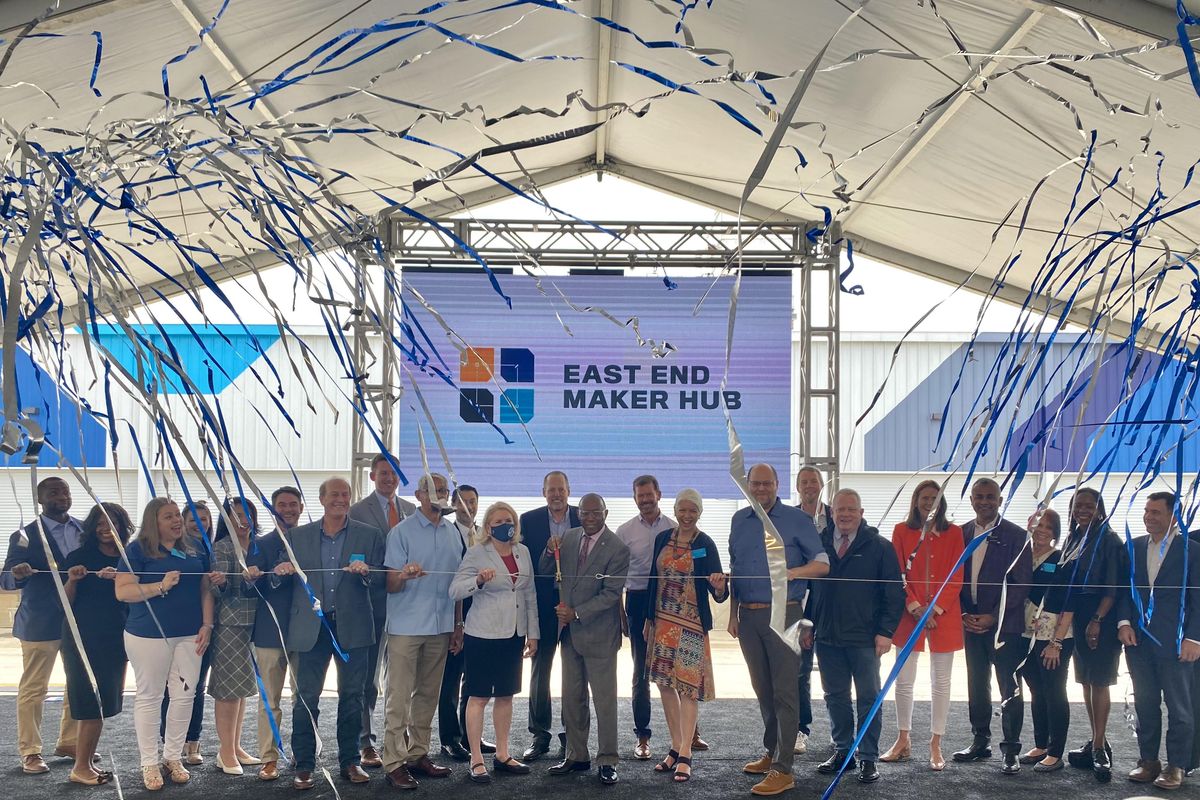The East End Maker Hub has landed perhaps its most intriguing tenant thus far — a Houston startup that makes 3D-printed human organs.
Volumetric Biotechnologies Inc. has leased 11,200 square feet at the East End Maker Hub to serve as its headquarters and manufacturing center. Jordan Miller, co-founder of Volumetric, says one of the benefits of being located at the hub will be access to a cleanroom operated by Alchemy Industrial, a 3D manufacturer of medical devices. Earlier this year, Houston-based Alchemy leased more than 5,400 square feet at the East End hub.
Volumetric will occupy space in the first phase of the 307,000-square-foot project East End Maker Hub. That phase of the $37 million project is set to open soon. The startup's current 5,000-square-foot headquarters is at 7505 Fannin St., near the Woman's Hospital of Texas and south of the Texas Medical Center.
Miller says Volumetric's new home will help it "maintain and accelerate our already breakneck progress." Volumetric's 12 biological, chemical, mechanical, and electrical engineers focus on producing human organs and tissues like the liver, kidney, pancreas, lung, and heart using a mix of medical-grade plastics and human cells.
"We're straining to scale our company as fast as our team is inventing and progressing our technologies. It's an absolutely wonderful problem to have," Miller says.
Volumetric hopes to commercialize its 3D-printed organs in 2021. Founded in 2018, Volumetric is a privately held spin-out of Rice University's Department of Bioengineering. It has received $1.8 million in funding, according to Crunchbase. Investors include Silicon Valley-based Sand Hill Angels, and the Springfield, Virginia-based Methuselah Foundation and Methuselah Fund.
Local Realtor Mike Pittman, a development associate with Pearland-based project partner Urban Partnerships Community Development Corp., recruited Volumetric to the hub. He says he's also working with a distillery, a coffee roaster, and a medical gown manufacturer on leasing space there.
 The first phase of the East End Maker Hub is set to open soon. Image courtesy of East End Maker Hub
The first phase of the East End Maker Hub is set to open soon. Image courtesy of East End Maker Hub
Once the East End Maker Hub opens, Houston's East End District will be home to the largest maker hub in Texas and one of the largest such facilities in the U.S. Being built in three phases on a 21-acre site at 6501 Navigation Blvd., the East End Maker Hub aims to create an environment that gives members of the community access to trade skills and career opportunities, and to provide businesses a place for innovation and manufacturing. The hub's second and third phases are on track to be finished in 2021.
The soon-to-open first phase will feature "white box" suites, ranging in size from 420 square feet to 20,000 square feet, that cater to three sectors:
- Innovation (robotics, 3D printing, and R&D)
- Crafting (ceramics, fine woodworking, and screen printing)
- Light fabrication (food production).
Aside from Alchemy, tenants recently lined up for the hub include Houston-based Waste Management Inc., whose R&D team will occupy more than 3,500 square feet, and Houston-based construction technology company Rugged Robotics Inc., which is renting 1,700 square feet.
"We're not the place for software companies, but our innovation area is the place for hardware companies — those that are into drones, robotics, 3D printing," Pittman says.
The project's hardware innovation element could boost Houston's manufacturing economy, he says. A recent analysis by the Smartest Dollar website found that 7.5 percent of the Houston metro area's workforce is employed in manufacturing. From 1999 to 2019, the number of manufacturing jobs in Houston grew by just 1.9 percent.
So far, the nonprofit TXRX Labs makerspace is the hub's largest tenant, having signed a lease for 65,000 square feet in the first phase. TXRX Labs and Urban Partnerships Community Development teamed up to develop the hub. TXRX contributed $1.25 million in equity, and Urban Partnerships Community Development raised $35.75 million in capital.
Houston-based Stewart Builders is the general contractor for the East End Maker Hub, and Houston-based Method Architecture is the architect of record.
Aside from supplying room for businesses and nonprofits to grow, the hub seeks to provide training and jobs for local residents. Pittman says the hub — located within a tax-advantaged Opportunity Zone — encourages its tenants to hire people who live within a three-mile radius.
"You don't have to go and get a Ph.D. in nuclear science for these jobs to be able to attain really good wages for your family," he says.
 Phases two and three of the hub are expected in 2021. Image courtesy of East End Maker Hub
Phases two and three of the hub are expected in 2021. Image courtesy of East End Maker Hub

 The EEMH has officially celebrated its grand opening. Photo by Natalie Harms
The EEMH has officially celebrated its grand opening. Photo by Natalie Harms




 The first phase of the East End Maker Hub is set to open soon. Image courtesy of East End Maker Hub
The first phase of the East End Maker Hub is set to open soon. Image courtesy of East End Maker Hub Phases two and three of the hub are expected in 2021. Image courtesy of East End Maker Hub
Phases two and three of the hub are expected in 2021. Image courtesy of East End Maker Hub
 Apple doubles down on Houston with new production facility, training centerPhoto courtesy Apple.
Apple doubles down on Houston with new production facility, training centerPhoto courtesy Apple.

